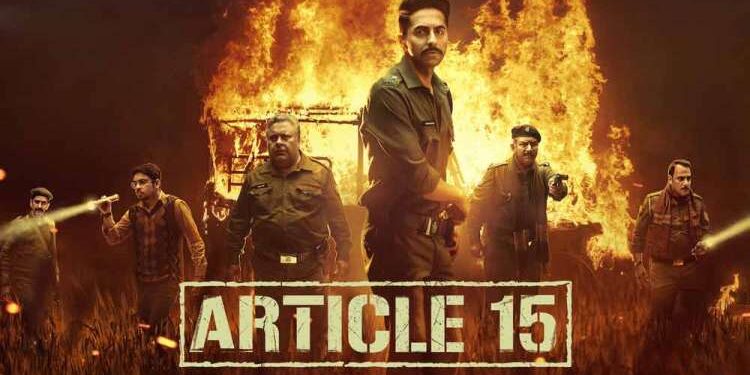Article 15 is an Indian film directed by Anubhav Sinha which breaks the barriers of commercial cinema by daringly approaching the social problems deeply rooted in India. Released in 2019, this punchy drama explores caste discrimination, inequalities and systemic violence that persist in the country.
Article 15 is an Indian film directed by Anubhav Sinha which breaks the barriers of commercial cinema by daringly approaching the social problems deeply rooted in India. Released in 2019, this punchy drama explores caste discrimination, inequalities and systemic violence that persist in the country.
The film draws its title from article 15 of the Indian Constitution. This article guarantees the equality of all citizens and prohibits any form of discrimination based on religion, caste, sex, gender or place of birth. By choosing this evocative title, the directors highlight the importance of this founding article in the fight against social injustices.
The story takes place in a village in Uttar Pradesh, where Ayan Ranjan, a Delhi police officer, is transferred. When he discovers the disappearance of three young girls belonging to the community of untouchables, and then two of them are found hanging from a tree, Ayan decides to conduct a rigorous investigation to discover the truth about these crimes and break the silence that surrounds discrimination.
The film realistically exhibits the atrocities suffered by marginalized people in India, faced with deeply rooted discriminatory practices. The directors are inspired by real events, such as the Badaun collective rape affair, to illustrate painful and often ignored realities facing many people in the country.
Article 15 It is not content to denounce the discrimination of caste, but it also explores other social problems such as sexual violence and corruption. The film highlights the gap between the principles set out in the constitution and the daily reality of individuals. He also criticizes the complicity and inaction of the authorities in the face of these injustices, thus denouncing the corruption and failure of the system.
The realization of Anubhav Sinha is remarkable, offering an authentic immersion in the complex realities of contemporary India. The film avoids clichés and excesses often associated with Indian cinema, favoring a sober and realistic approach. The performances of the actors, especially that of Ayushmann Khurrana in the role of Ayan, are remarkable and add an emotional depth to history.
Article 15 is a film that arouses reflection and encourages social change. He was praised for his ability to raise public awareness of persistent injustices and inequalities in India.
By approaching sensitive subjects with courage and sincerity, Article 15 contributes to opening dialogue on discrimination and questioning discriminatory social norms. He encourages spectators to think about the inequalities that persist and actively commit to a positive change. It is also an urgent appeal for action and solidarity to combat discrimination and establish a more egalitarian company in India. He reminds us that the effective application of article 15 of the Constitution is essential to build a fairer and equitable future.
In Tunisia, Article 15 is available on Netflix, in original version, subtitled in Arabic, English and French.
For information, here is a French translation of articles 14, 15 and 17 of the Indian Constitution of 1950. The film shows that in reality, they are in no way applied.
Article 14: Equality before the law. The State cannot refuse a person equality before the law or the equal protection of laws on the territory of India.
Article 15: Prohibition of discrimination based on religion, race, caste, sex or the place of birth. (1) The State must not discriminate a citizen only because of his religion, his race, his caste, his sex, his place of birth or one of these criteria.
(2) No citizen can, only because of his religion, his race, his caste, his sex, his place of birth or one of these criteria, be the subject of a handicap, a responsibility, a restriction or a condition with regard to:
(a) Access to shops, public restaurants, hotels and places of public entertainment;
(b) The use of wells, tanks, bathing ghâts, roads and public holiday resorts maintained in whole or in part by state funds or dedicated to the use of the general public.
(3) Nothing in this article prevents the State from taking special measures in favor of women and children.
(4) Nothing in this article or in the clause (2) of article 29 prevents the State from taking special measures for the promotion of certain socially and educational classes of citizens or for the castes listed and the tribes listed.
Article 17: Abolition of untouchability. “Intouchability” is abolished and its practice in any form is prohibited. The imposition of any incapacity arising from “untouchability” is a crime punishable by sanctions in accordance with the law.
Neïla Driss









